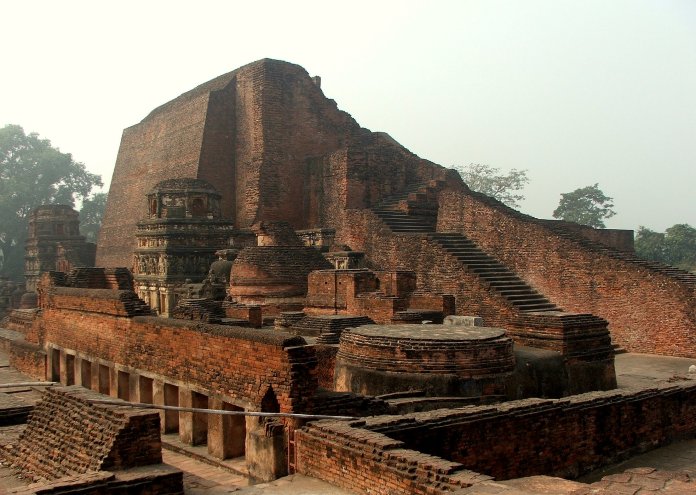The Hindus of the Indian subcontinent today occupy a unique place in the world. They represent the last stand of indigenous tradition. In many countries of both east and west, monocultural monotheist cults have succeeded in wiping out ancient, indigenous, polytheistic traditions. Hinduism, Buddhism and other Eastern traditions today survive in only a few countries such as India, Thailand, Japan etc.
How humanity moved backward
Around 1500 years ago, the situation was vastly different. In most of the world, including Asia, Africa, the Middle East, local traditions and practices prevailed and there was thus much cultural diversity. Around 2000 years ago, mono cults desirous of world domination were only restricted to a small part of the world.
Since the time of Emperor Justinian in the sixth century, paganism was entirely wiped out from the Roman empire and eventually from Europe. The practice of committing cultural genocide was not new to the ancient Romans, who had already performed such acts with the Gauls and the Carthaginians.
Similarly, a second wave of attempted monotheistic world domination came from the deserts of Arabia and Central Asia and wiped out much of the pagan practices of peoples in surrounding regions. It appears, at least from a geographical viewpoint, that the Hindus of India form the final frontier against the total cultural genocide of indigenous customs and practices.
The disaster of monotheism:
One could always begin to question the value of such local practices and traditions that could not even withstand the onslaught of a violent group of fanatics. It could be inferred that those customs that could not self-sustain need not be artificially resuscitated. The answer to this lies in the monotheistic Bible itself in Matthew 7:
Beware of false prophets. They come to you in sheep’s clothing, but inwardly they are ravenous wolves. By their fruit you will recognize them.
One needs to decide the value of a culture or a civilization by the fruits which it produced. The result of monotheism being imposed by force on this world has been the loss of original human thought and culture. There was little progress made in the fields of science and philosophy in the western world for a long time after the advent of monotheism. This remained the case until the church beliefs and dogmas began to be questioned. These problems of imposed belief did not exist during the pre-monotheistic time when paganism ruled the roost.
The question of woman empowerment and rights also remains an unsolved problem for the mono cults which essentially view the female with suspicion as opposed to pagans who tend to view the female as sacred. The mono cults have contributed greatly to the degradation of the status of women and female traditions. The Christian mass lynchings of women in Europe and America in the name of witch hunting is only one example.
India had produced giants of philosophy, science, mathematics etc before the civilisation began to be battered by the onslaught of the Central Asian and European invaders. It can be noted here that the Aryan invasion of around 3500 years ago brought in fresh polytheistic perspectives to an already polytheistic population. Thus, the Aryans were indigenized. Aryabhatta, Bhaskara, Kanada, Adi Shankara are only a few examples of intellectual giants who strode in this land thanks to the freedom of thought that developed over the millennia thanks to the indigenous Hindu culture.
Cultural genocide of local traditions and practices, many of which of which are oral records from ancient times leads to an atmosphere of fear and brutality. This is one of the fundamental mistakes of the mono cults that try to impose themselves on the world by wiping out all local cultures similar to the parasitic behavior seen in the biological world.

Hindu progress disrupted by monotheism: Ruins of the Nalanda University
How to fight cultural genocide
In order to fight cultural genocide, Hindus have to strategise and organise. A multi-pronged approach can be conceived to protect, preserve and propagate the dharma.
- Intellectual arena: Writing and reading books, articles and pamphlets. Publishing of popular videos, podcasts and other digital media. Conducting debates, seminars, lectures and courses. The internet has become the best avenue to fight the battle for the mind.
- Legal battles: Many discriminatory laws exist to persecute Hindus in violation of fundamental rights offered to all citizens by the constitution. These have to be legally challenged and overthrown.
- Physical fitness: In order to be taken seriously, one needs to be physically fit and agile. Swami Vivekananda emphasized the importance of physical fitness by quoting the Upanishadic statement “nayamatma balahinena labhyah”, the self cannot be realized by the physically weak.
- Social arena: Community festivals and yagnas need to be organised and celebrated. These events form the basis of a free dharmic society. Temples need to once again become the center of Hindu life. Legal battles need to fought to free temples from the clutches of corrupt bureaucrats and politicians.
- Institutions: It has to be first accepted that the academia, the media and the bureaucracy in India and the west are permanently damaged institutions. These institutions have make their livelihood by defaming and destroying indigenous Hindu cultures. The way to fight the totalitarian establishment is to not play the game on their terms. Hindus should build and promote alternative media and institutions that expose the charlatanry of the enemies of dharma.
These strategies(and more) need to be adopted broadly. However, the expectation is not that the Hindu masses will suddenly change their minds and overcome their inertia overnight. History demonstrates that it is a few intransigent minorities inside a society who are able to bring about the most change. So, the adoption of these strategies needs to be undertaken by small groups of highly dedicated people. It is such small groups of people who tend to have the most impact as opposed to utopian mass movements which rarely have any effect.


